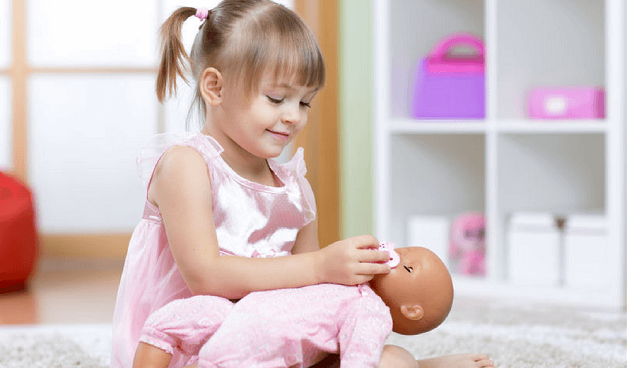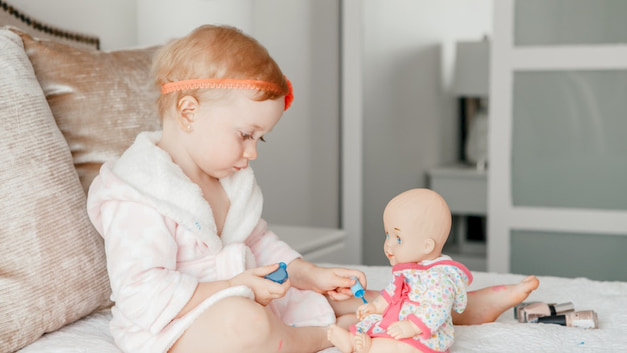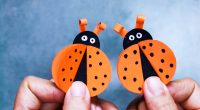The Importance of Playing with Dolls for Your Child’s Emotional Development

Source: whatmomslove.com
Dolls are some of the oldest toys for children, and there’s a good reason why they’ve been so long lasting throughout history. Children learn by doing and baby dolls allow them to gain a better understanding of themselves, as well as the people around them. Playing with dolls can provide important emotional development for children, regardless of gender. It helps children create a safe environment in which they can experiment with seeing the world from other perspectives and learning empathy and interaction strategies.
When children play with dolls, they use them to create realistic worlds or fill in for friends. At the same time, they have both sides of every conversation, thus learning about communication, problem solving and empathy as well. Dolls these days are modernized and optimized, reflecting the world the children are growing up in. Baby dolls work mainly because kids don’t need instructions to understand how to use them, it comes naturally.
Miniland Educational Dolls are an important educational resource that helps understand the concept of family, population groups, coexistence and respect for racial and sexual diversity. Miniland Doll is an anatomically correct doll, lightly scented to smell like a newborn baby. Made in Spain, from a Phytalates-free vinyl, Miniland Baby Doll is soft to the touch, resilient and flexible. The doll design has been developed to take your child on a cognitive development journey, encouraging him or her to take care of the baby and socially engage through imaginative role play. Miniland Baby doll features an articulated head, arms and legs and is suitable for kids of 18 months of age and above.
The Benefits of Playing with Dolls
The baby doll is a great choice of toy, giving your child the opportunity to own and play with it during his/her toddler years. Here are some of the benefits playing with dolls can provide for your child’s growth.

Source: playandgrow.com
Developing Cognitive and Fine Motor Skills
Baby dolls make it easier for children to practice their cognitive and fine motor skills. They give them an opportunity to develop these skills by applying them on someone or something else before they start applying the same to themselves. Usually, around the age of two or three, children begin to act as if their doll can interact with them, so they are feeding the doll and putting it to sleep. Also, kids can practice putting on clothes on their dolls. Getting small doll clothes on can be tough for children and typically it’s much easier for them to master this skill by practicing on a doll first.
Another skill a child can easily develop by playing with dolls is using both hands in midline. This is expected to appear around the age of a year and a half and can coincide with the development of skills such as zipping or unzipping or while holding the doll and pretending to feed it. More importantly, as children’s pretend play skills develop, their self-feeding skills develop, too. Feeding their doll, they practice holding and using spoons, bottles, bowls and other feeding items.
With dolls, children get an opportunity to practice hygiene skills such as brushing hair and teeth, washing hands and taking baths. If the doll is not allowed to get wet, children can give it a bath with pretend water. That way they learn the steps taken during bath time and can have more control over the experience, especially if they have certain fear when bath time comes.
Developing Speech Skills
A baby doll can help expand your child’s pretend play, and he or she can learn a lot of words through their play, using and practicing their speech and language skills. Typically, it starts with teaching various body parts like eyes, nose, ears, hands, fingers, feet and more. This way the child gets an opportunity to practice this vocabulary and generalize it to other people.
Furthermore, you can use the baby doll’s clothes to teach the names of clothing items like shirts, pants, dresses, etc. Using the doll with other baby toys such as a bed and blanket can teach some basic concepts like colours and prepositions when the baby doll is in the bed, or under the blanket. The same goes for using the baby doll with a bottle or bowl, teaching verbs and feelings like eat, drink, hungry, thirsty, and so on.
While your child is playing with the doll, you can ask him or her different questions to work on their understanding of all those words while they’re engaged in play. As you ask the questions, they can point to the right body parts, clothes or tell you if the baby’s hungry, needs to sleep or take a bath maybe. Baby dolls can be an excellent tool to use to help your kid learn appropriate social and pragmatic skills.

Source: eu.clipdealer.com
Developing Social-Emotional Skills
Doll play helps children to understand their world and the world around them. Through play, kids practice nurturing and caring skills and usually, they repeat moves they see a parent or a caregiver is doing. This is especially important if you’re preparing your child for the coming of a sibling in their life.
These skills are important for the emotional development of children, regardless of their gender. By carrying, holding and feeding a baby doll, children are practicing how to be loving to others. On the other hand, a doll play can be a way for children to re-enact some events and take on the opposite role, usually the role of a parent or caregiver, which allows them to see things from a different point of view. It’s a valuable social-emotional skill that can help them in their further growth. This way a child gets the chance to practice being in control over things, but in a safe way.
The Importance of Ethnic Dolls
Kids can notice race at young age, and as they grow, they become more aware of themselves and the people around them. Ethnic dolls are one of the ways to surround children with positive images of the outset. They provide a great opportunity to share cultural experiences with kids that can strengthen their love for their ethnicity and other ethnicities, too. Baby dolls are inspiring for children and can create the foundation of who they will be in the world socially.



